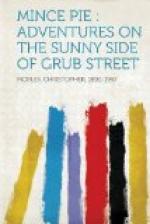It is a great mistake. Such crass and breathless promptness takes away a great deal of the pleasure of correspondence.
The psychological didoes involved in receiving letters and making up one’s mind to answer them are very complex. If the tangled process could be clearly analyzed and its component involutions isolated for inspection we might reach a clearer comprehension of that curious bag of tricks, the efficient Masculine Mind.
Take Bill F., for instance, a man so delightful that even to contemplate his existence puts us in good humor and makes us think well of a world that can exhibit an individual equally comely in mind, body and estate. Every now and then we get a letter from Bill, and immediately we pass into a kind of trance, in which our mind rapidly enunciates the ideas, thoughts, surmises and contradictions that we would like to write to him in reply. We think what fun it would be to sit right down and churn the ink-well, spreading speculation and cynicism over a number of sheets of foolscap to be wafted Billward.
Sternly we repress the impulse for we know that the shock to Bill of getting so immediate a retort would surely unhinge the well-fitted panels of his intellect.
We add his letter to the large delta of unanswered mail on our desk, taking occasion to turn the mass over once or twice and run through it in a brisk, smiling mood, thinking of all the jolly letters we shall write some day.
After Bill’s letter has lain on the pile for a fortnight or so it has been gently silted over by about twenty other pleasantly postponed manuscripts. Coming upon it by chance, we reflect that any specific problems raised by Bill in that manifesto will by this time have settled themselves. And his random speculations upon household management and human destiny will probably have taken a new slant by now, so that to answer his letter in its own tune will not be congruent with his present fevers. We had better bide a wee until we really have something of circumstance to impart.
We wait a week.
By this time a certain sense of shame has begun to invade the privacy of our brain. We feel that to answer that letter now would be an indelicacy. Better to pretend that we never got it. By and by Bill will write again and then we will answer promptly. We put the letter back in the middle of the heap and think what a fine chap Bill is. But he knows we love him, so it doesn’t really matter whether we write or not.
Another week passes by, and no further communication from Bill. We wonder whether he does love us as much as we thought. Still—we are too proud to write and ask.
A few days later a new thought strikes us. Perhaps Bill thinks we have died and he is annoyed because he wasn’t invited to the funeral. Ought we to wire him? No, because after all we are not dead, and even if he thinks we are, his subsequent relief at hearing the good news of our survival will outweigh his bitterness during the interval. One of these days we will write him a letter that will really express our heart, filled with all the grindings and gear-work of our mind, rich in affection and fallacy. But we had better let it ripen and mellow for a while. Letters, like wines, accumulate bright fumes and bubblings if kept under cork.




